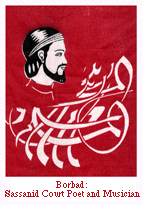
|
Jalal Huma'i translated by
copyright 1995 |

|
Jalal Huma'i translated by
copyright 1995 |
The voice of Taj, and the music of Saba For the throne of the Kaianian, A throne of much less value. | 
|
Jalal was born in 1904 in the city of Isfahan. A while before his death, however, he had told his friends that he was 85 years old which would put his birth date at about 1897. His father was Shaykh Isma'il, known as Taj al-Wa'izin (the crown of the orators). In addition, I should add that Taj's father had a penetrating voice and knew every radif in Iranian music.
Jalal was heir to his father's vocal ability and was trained by him. Taj al-Wa'izin discovered his son's talent by accident when, one night, he came home sooner than usual. Entering the yard, he heard a pleasant voice coming from one of the rooms. Listening carefully, he recognized his nine-year-old son's voice. He enjoyed this pleasant surprise but did not share it with Jalal until the latter was ready for instruction. Jalal was twelve when his formal instruction began.
Jalal's father taught him all that he himself knew before sending him to other masters like Naib Asadullah, the nai (flute) player, and Sa'id Rahim Isfahani to master the subtleties of the singing profession. Jalal spent some time with these masters before being instructed by Mirza Hussein Sa'atsaz, Mirza Habib Shatir Haji, and Haj 'Andalib.1
When he was twenty years old, Taj traveled to Tehran and participated in an annual concert organized by Ibrahim Nahid. Other participants included Murtiza Mahjubi and Murtiza Nai Davud. Taj entered the stage simply attired and sang Farrukhi 's famous ghazal:
His clear and penetrating voice enchanted the audience. When Radio Iran began operation, he joined the music production department and added many valuable works to the repertoire of traditional Persian music. In fact, to his last minutes, Taj continued to sing. He was one of a few singers who enjoyed a clear voice to the end of his life.2 About Taj, Jalil Shahnaz says, "Among Iranian singers, male or female, I have not encountered anyone who approaches either the voice or the knowledge of music of Taj, not to mention his peerless ethics."3
Taj's Sense of Relevance
All Iranian musicians familiar with Taj recognize his two virtues. His good behavior and social grace-evident when we understand that he went out of his house early in the morning to sing for the street cleaners-and his recognition of the appropriateness of the song to the occasion. He could make this distinction perhaps because he had memorized an enormous number of poems. Regarding this, Hassan Kasa'i says, "Taj learned the importance of the relevance of the song to the occasion from Rahim Isfahani. If he was singing in a birthday celebration for Javad, for instance, he was sure to sing something that included the word "Javad."4
With People and For the People
Another aspect of Taj, more important than his artistic talent, was his humanity and respect for the individual. During his 86 years in this world, he never neglected the people. He continued to live among the people, with the people, and for the people. He shared peoples' pain and took pleasure in their joy. He shared his talent with people and identified with the down-trodden as one who had emerged from among them.5
Jalal Taj-i Isfahani died in 1982 of heart ailment. The influx of war dead preventing a proper ritual cleansing, the artist's body was prepared for burial at home before it was carried to Takht-i Pulad, Isfahan's graveyard. There he was put to rest, amid lamentations, beside his sister and father.6
A loaf of bread is all Farrukhi desires of life
Without that, too, his life will go on.
O bird of midnight, begin your lament
Remind me of my troubles anew.
Selected Bibliography
From the Hymns of Zarathustra to the Songs of Borbad